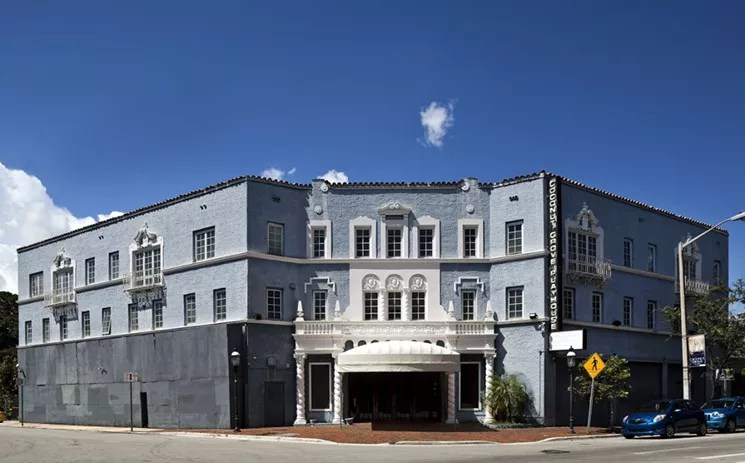
Courtesy of Dade Heritage Trust

Audio By Carbonatix
Update: After publication, the county stated it had prepared the playhouse for the storm and afterwards issued a statement saying the only damage was “to replace and repaint the plywood that sheaths the scaffolding at the ground level of the historic front building on Charles Street.”
Everything Irma touches in the next couple of days will be subject to lashing winds. When the storm collided with Barbuda, it destroyed more than 90 percent of the island’s buildings with winds over 185 mph. While Irma has now been lowered to a Category 4 hurricane, many locals still worry that the Magic City’s older buildings – those built before stricter building codes were enforced after Hurricane Andrew – may not withstand what authorities have called the “most powerful Atlantic hurricane” in recorded history.
One particular building stands out as being especially vulnerable to an onslaught by Irma: the Coconut Grove Playhouse, which was built in the 1920s. On top of its age, one reason the building may be especially susceptible to damage is that there have been few efforts to protect the building from the storm.
Via email, Max Pearl, who runs the Facebook page Save the Coconut Grove Playhouse, called out Michael Spring, the director of the Miami-Dade County Department of Cultural Affairs, for not taking the initiative to preserve the building.
“Last year and years prior, no hurricane preparations were taken to protect the Coconut Grove Playhouse from catastrophic damage,” wrote Pearl. The Playhouse has fallen into disarray since it closed in 2006. “As the steward of the playhouse, it is your responsibility to take safety measures to protect our theater. Why has this not been done over the years as hurricane season approached, and why isn’t it being done now as a Category 4 Irma threatens?” (New Times reached out to Michael Spring on Thursday and Friday, but he could not be reached. If he responds, this story will be updated.)
In recent months, many locals have expressed outrage over a tentative renovation plan that would downgrade the structure from 1,130 seats to a mere 300 – a downscaling of about 75 percent. “It’s ridiculous,” says Coconut Grove resident and actress Gabrielle Anwar, who starred in shows The Tudors and Burn Notice. Anwar, along with many other locals, believes it would be a slap in the face of the local performing arts community if the venue’s seats were so massively downsized.
“Our target number of 700 is based on a series of professional studies conducted by experts, which included a letter from the Arsht Center’s administration recommending a theater in this size range,” says Olga Granda-Scott, who oversees the Playhouse Foundation. “Note that the average Broadway theater seats 800-1,000, so it’s more or less the smallest size we feel could return it to being a theater where productions originate and then move on to Broadway, as with Fame: the Musical or Neil Simon’s The Sunshine Boys.”
The fate of the playhouse remains uncertain, with no plans finalized. Some locals believe that neglecting to protect the playhouse from